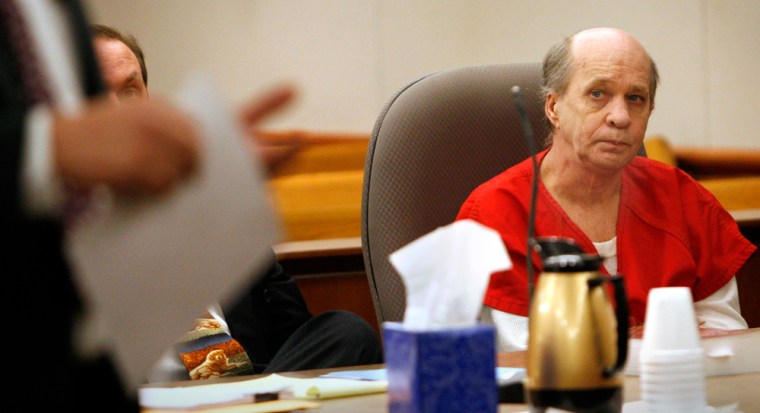Ruth Lunsford often visits the grave of her granddaughter, Jessica, most recently to tell her that the man accused of kidnapping, raping and murdering the third-grader nearly two years ago is finally about to stand trial.
“I went to the grave site and said to Jessie, ’It’s almost over,”’ she said in an interview. “I know she’s looking down on us and saying, ’Good job.’ When this is all over, she’s going to be doing cartwheels all over heaven. She’s going to be saying, ’Amen.”’
Jury selection began Monday in the trial for John Evander Couey, a 48-year-old convicted sex offender who faces the death penalty for Jessica’s 2005 slaying if he is found guilty.
Circuit Judge Richard Howard denied a defense request to further delay the trial, saying, “The fact of the matter is, this case is going forward.” A few minutes later, he began questioning prospective jurors about their knowledge of the heavily publicized case.
Court recessed for the day after 52 potential jurors were questioned, with 14 returning for a second round of interviews. The will be no jury selection Tuesday because a hearing on a defense motion could take several hours, Howard said.
Publicity had forced the trial to be moved from Citrus County, where the abduction occurred, to Miami.
Choosing a jury was expected to consume much of the week, with the final panel sequestered. News organizations are barred from showing the faces of jurors or reporting their names.
Tougher laws nationwide
Jessica’s death had led to tougher sex offender laws in Florida and at least 18 other states and prompted creation of the first-ever coordinated Justice Department effort to track down noncompliant offenders nationwide, such as those who fail to register or aren’t living where they are supposed to.
“The impacts of Jessica Lunsford’s story have been huge,” said Ernie Allen, president and chief executive officer of the National Center for Missing and Exploited Children in Alexandria, Va. “In our view, enormous good has come and thousands of children’s lives are going to be saved because Jessica Lunsford lived.”
In that way, Jessica has joined a tragic list of other children — Adam Walsh, Jimmy Ryce, Amber Hagerman, Megan Kanka and others — whose names are synonymous with important reforms in the criminal justice system.
“We look forward to the day when it doesn’t take a tragedy involving a child to motivate people to action,” Allen said.
Three-week search
Jessica, a vivacious and happy third-grader, was abducted one night from her bedroom in the small town of Homasassa.
Her body was found three weeks later, on March 19, 2005, buried in garbage bags behind a mobile home a short distance from her own house. She had her favorite stuffed dolphin and her hands were bound by speaker wire, but authorities say it appeared she had tried to poke her fingers through the bags. She died of asphyxiation.
Couey, who was arrested for previous sex crimes involving children in 1978 and 1991, was living with his half-sister at the trailer near the Lunsford home. But authorities searching for Jessica didn’t know that, because he had moved there without telling them as required under sex offender registration laws.
As the search intensified, Couey traveled to Georgia, where he was arrested on an unrelated Florida warrant. He confessed to Jessica’s abduction and murder to two Citrus County sheriff’s detectives who traveled there to interview him, but that taped confession was thrown out by a judge because Couey wasn’t allowed to consult a lawyer as he requested.
That means the jury won’t hear what is perhaps the strongest evidence against Couey. But the jury will be told that Couey described where to find Jessica’s body and that he told jail guards and others about his alleged role in the crime. Prosecutors have DNA and other evidence placing Jessica in the Couey mobile home before she died.
Couey’s attorney, public defender Dan Lewan, has repeatedly declined to discuss the case.
